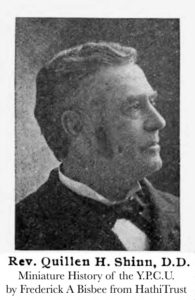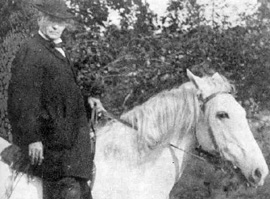 Quillen Hamilton Shinn (January 1, 1845-September 6, 1907), Universalist minister and well-traveled missionary, is known as the “St. Paul of the Universalist Church.” He has been credited with starting at least 40 churches and inspiring nearly 30 persons to enter the ministry.
Quillen Hamilton Shinn (January 1, 1845-September 6, 1907), Universalist minister and well-traveled missionary, is known as the “St. Paul of the Universalist Church.” He has been credited with starting at least 40 churches and inspiring nearly 30 persons to enter the ministry.
Quillen was born in Bingamon, Virginia (later West Virginia), the son of Elisha Shinn, a pioneer farmer who died in 1847, and Mary (LeFevre) Shinn. His mother remarried widower Jacob H. Fortney, a Universalist physician with a large family. Universalist writings made a strong impact on Quillen and his half-brothers, two of whom, like Quillen, became Universalist ministers. Quillen spent much time outdoors as a youth, working on the family farm. He learned horsemanship, a skill that later became an asset in his missionary travels. Serving in the Union Army during the Civil War, he participated in twelve military engagements, was briefly a Confederate prisoner, and was present at Robert E. Lee’s surrender at Appomattox Courthouse. After being discharged he studied at a Methodist academy in Mount Union, Ohio.
Shinn was introduced to Universalism by his step-father and by reading Thomas Thayer’s Theology of Universalism. He attended his first Universalist worship service, in Kent, Ohio, and soon after, heartened by his success as a temperance lecturer, decided to prepare for the ministry. In 1867, while on his way to the Canton Theological School at St. Lawrence University, he stopped at Baltimore to attend the Universalist General Convention. Upset by the heated debates that were going on over the Winchester Profession of Faith, Shinn, without being recognized, took the floor and chastised the delegates, reportedly saying that “the Universalist ministers could write better than they could speak” and that he was tempted to change his plans and go back to West Virginia. It was said that his words changed the “Baltimore bedlam” into a “love feast.” At Canton he did well, studying primarily under Ebenezer Fisher, the school’s president, and graduating as one of 12 members of the class of 1870.
After receiving fellowship from the Vermont Convention, Shinn was ordained in Gaysville, Vermont, where he served 1870-72. In 1872-73 he traveled in West Virginia as an independent missionary preacher. His attempt to establish a church in Wheeling, West Virginia was unsuccessful. In 1873 he worked for the Universalist Publishing House as a traveling agent, then served a series of New England churches: Tyngsboro and Dunstable, Massachusetts, 1873-74; Second Universalist Church, Lynn, Massachusetts, 1874-77; Foxboro and Mansfield, Massachusetts, 1877-81; Plymouth, New Hampshire, 1881-c.1884; Rochester, New Hampshire, c.1884; Deering and Westbrook, Maine, c.1884-89; and Rutland, Vermont, 1889. In each settlement he established a preaching circuit. In Plymouth, New Hampshire he had 14 preaching stations and led the first National Summer Meetings in a tourist resort. While visiting Portland, Maine in 1876 he met and married Maria Burnell. The Shinns had four sons.
After organizing a church in Omaha, Nebraska, 1889-91, Shinn announced that henceforth he would devote himself to full-time work as an independent missionary. In 1895, having established himself, he was appointed by the General Convention as its General Missionary. His first biennial report stated that in less than three years he had traveled more than 15,000 miles, averaging almost one sermon or address a day; had worked in 34 states, the District of Columbia, and two Canadian provinces; had organized eight churches, four state conferences, a number of Young Peoples Christian Unions, Ladies Aid Societies, mission circles, and seven summer meetings.
Shinn had a standard method of operation in evangelizing a town. He would advertise his coming through billboards and flyers, announcing one or more meetings to be held in a place he had reserved—a church, public hall, store, home, whatever was available. At these meetings he would preach the Universalist message, entertain questions, and explain how a new Universalist group could be organized. If there was enough interest, he would select a leader to coordinate the group’s efforts at organizing a building fund, a ladies’ aid society, a youth group, and other activities. Having laid this groundwork, he would return periodically, hoping to organize a church and find it a part-time minister. Because he made so many stops in his travels and his visits were so brief, his detractors claimed that he spread his efforts too widely, and called him the “Grasshopper Missionary.” Although most of the groups Shinn started failed to survive for long, a number did, and, whatever the outcome, he had spread the Universalist message. He was the best-known Universalist in the country.
After five years the General Convention redefined Shinn’s role geographically by naming him Missionary to the Southern States, working under the direction of Isaac M. Atwood, its newly appointed first General Superintendent. Atwood, unsympathetic to Shinn’s methods and mindful of the shortage of clergy, wished to restrict church extension to a few urban centers. Because the General Convention was hard pressed financially to maintain both a General Superintendent and a Southern Missionary, Shinn narrowly avoided, in 1901 and in 1903, having his office abolished. Among his accomplishments as Missionary to the Southern States, he played a leading part in the establishment of missions in Norfolk and Suffolk, Virginia to serve African Americans and the “Friendly House” mission in the mountains of western North Carolina.
 Shinn’s message remained essentially unchanged throughout his career, reflecting his belief in the centrality of the Bible, the love of God, the parenthood of God, the immortality of the soul, the divinity (though not the deity) of Christ, the certainty of punishment for sin, and the universality of salvation. He contended that “there is no hell for any of us to fear, outside of ourselves.” He had no use for modern Biblical criticism, was suspicious of liberalism of any kind, disliked Unitarians with their “go-as-you-please church,” and was an uncompromising opponent of the use of alcohol, tobacco, and profanity. While not a social activist in the usual sense of that term, he was an active member of the National Prison Association and at one time served as chair of a denominational committee on penal reform. He was an unremitting adversary of capital punishment and a strong supporter of women’s rights.
Shinn’s message remained essentially unchanged throughout his career, reflecting his belief in the centrality of the Bible, the love of God, the parenthood of God, the immortality of the soul, the divinity (though not the deity) of Christ, the certainty of punishment for sin, and the universality of salvation. He contended that “there is no hell for any of us to fear, outside of ourselves.” He had no use for modern Biblical criticism, was suspicious of liberalism of any kind, disliked Unitarians with their “go-as-you-please church,” and was an uncompromising opponent of the use of alcohol, tobacco, and profanity. While not a social activist in the usual sense of that term, he was an active member of the National Prison Association and at one time served as chair of a denominational committee on penal reform. He was an unremitting adversary of capital punishment and a strong supporter of women’s rights.
On the last of Shinn’s many trips, he revisited the four churches in South Carolina in the summer of 1907. That fall, soon after returning to his home in Medford, Massachusetts, he fell ill and died of rheumatic fever. His funeral was held in the Tufts College chapel with 35 ministerial colleagues in attendance. Memorial services were held all over the country. His body was interred in the Evergreen Cemetery in Portland, Maine.
In 1895 Shinn had been honored by St. Lawrence University with a D.D. degree, and more honors came to him after his death. A lectureship was established in his name, and in 1916 the Shinn Memorial Church was opened in Chattanooga, Tennessee. Over half of the funds for its construction came from the efforts of the Young People’s Christian Union (YPCU), the national youth organization that Shinn had fostered decades earlier and to which he had been appointed national organizer in 1893. The church served for many years as the headquarters of what originally was known as the Southern Universalist Young People Institute (A joint project of the General Sunday School Association, the Women’s National Missionary Association, and the YPCU). In addition to his dedication to youth work, Shinn led the Universalist effort to establish summer camps and conference centers, among them The Weirs, on Lake Winnepesaukee, New Hampshire, and Ferry Beach, on the Maine coast.
Shinn kept detailed records of his work but had little scholarly inclination, and there are few existing examples of his writings. He spoke almost always either extemporaneously or from notes. While his message may seem dated and ultra-conservative to present-day Unitarian Universalists, in its time it played a crucial role in keeping Universalism alive and relevant.
The Quillen Hamilton Shinn papers, including diaries, letters, printed missionary letters, Civil War and temperance writings, and an unpublished novel, are in the Andover-Harvard Theological Library in Cambridge, Massachusetts. His published writings include Our Mission Field (1898) and Good Tidings (1900). A biography with excerpts of Shinn’s writings is William H. McGlauflin, Faith with Power: A Life Story of Quillen Hamilton Shinn, D.D. (1912) . There is a chapter on Shinn in Russell Miller, The Larger Hope, vol. 2 (1985) and biographical articles in David Robinson, The Unitarians and the Universalists (1985) and Mark Harris, Historical Dictionary of Unitarian Universalism (2004).
Article by Charles A. Howe
Posted January 28, 2006